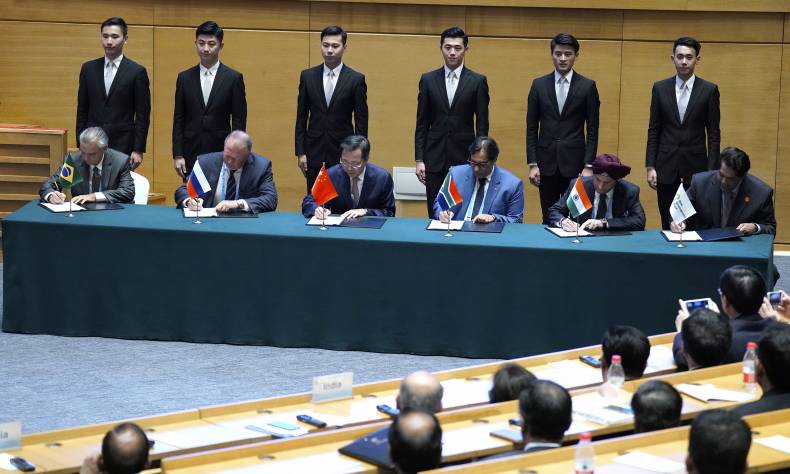
Xiamen BRICS Summit Showcases New Pathways of South-South Cooperation with Chinese Contributions
The Xiamen Summit, under the theme of “BRICS: Stronger Partnership for a Brighter Future”, is set to be a key milestone in connecting the past and future of BRICS cooperation.
By Wang Lei
The successful 9th BRICS Leadership Summit and an equally successful Dialogue of Emerging Markets and Developing Countries were held in Xiamen, Fujian Province from September 3-5, 2017.
The Xiamen Summit, under the theme of “BRICS: Stronger Partnership for a Brighter Future”, is set to be a key milestone in connecting the past and future of BRICS cooperation.
The Xiamen Summit has set up a new stage for internal development and external cooperation within and among the BRICS nations. Hence the importance of this summit is self-evident.
The success of the Xiamen Summit also mirrors the success of China’s great power diplomacy with Chinese characteristics since the opening of the 18th National Congress of the Communist Party of China.
Chinese great power diplomacy takes win-win cooperation as the core and pursues a community with a shared future. It has won widespread acceptance from the international community.
Establishing a New Model of Great Power Relations
This BRICS Leadership Summit has been a significant manifestation of China’s new philosophy of great power relations. At the meeting, CPC Secretary General Xi Jinping pointed out that “we owe the rapid development of BRICS cooperation to our adoption of a right approach. Guided by this approach, we have respected and supported each other in following the path of development suited to our respective national conditions; we have pushed forward economic, political and people-to-people cooperation in an open, inclusive and win-win spirit.”
Since the 18th National Congress of the CPC, the CPC Central Committee led by Comrade Xi Jinping has grasped the intricacies of great power relations and the historical trends of the new era, and steered the tactics of China’s great power relations with other countries. The BRICS mechanism is a product of the worldwide rise of the emerging great powers; its members all wield both regional and international influence.
The summit has set up a “three-wheel drive” framework for BRICS cooperation that focuses on national political security, practical trade and commerce, and people-to-people exchanges. This cooperation framework between emerging powers has broken down the wall of traditional western international relations theory, replacing superpower games and balanced power thinking with a new model of great power relations which advocates partnership rather than alliance. It also reflects China’s efforts to establish a new model of international relations characterized by mutually beneficial cooperation and a new model of great power relations under the principle of “no conflict or confrontation, mutual respect, mutually beneficial cooperation.”
Promoting Reform of Global Governance
The Xiamen BRICS Leadership Summit is a vital node in China’s promotion of global governance reform. Xi has noted that “We BRICS countries are committed to upholding global peace and contributing to the international security order… (We should) firmly support multilateralism, work for greater democracy in international relations… and promote the building of an open global economy.”
Since the 18th National Congress of the CPC, the central committee of CPC has set a high premium on reform of global governance; the topic has twice been the focus of routine group studies among the members of the Political Bureau of CPC this past year.
The world is currently confronted with chaotic phenomena like opposition to globalization and the peacetime dividend, and deficits in international development, governance, and political and economic systems. The Xiamen Summit has raised the idea of “BRICS solutions” to tackle these problems, which reflects the will of emerging markets and developing countries.
The summit proposed to promote the democratization and legalization of international relations, to carry out structural reform on existing international financial and trade systems and the governance framework, to strengthen the voice and representation of emerging markets and developing countries, and to drive development of the international order in ways that are fairer, more reasonable and just, and better balanced.
Expanding diplomatic exchanges with developing countries
The Xiamen Summit is an important element of China’s diplomatic exchanges with developing countries. Xi has noted that the BRICS countries have all gone through “an arduous course of development”, and emphasizes that we should “develop ourselves to help others with the well-being of the world in our minds.”
BRICS nations are the fastest-growing and best-performing emerging economic entities among developing countries. China is the world’s biggest developing country. Taking the role as host of this year’s BRICS cooperation, it has proposed the “BRICS Plus” model and invited other representative emerging and developing countries to participate in the Dialogue of Emerging Markets and Developing Countries.
“BRICS Plus” has further enhanced the image of BRICS in the developing world, which will support the drive to establish a global partnership network and encourage its members to be the most effective and the most important platforms for south-south cooperation. The mechanism has also further demonstrated the evolving nature of BRICS and China’s emphasis on the importance of expanding diplomatic exchanges with developing countries.
China has played the leading role in BRICS cooperation. The Xiamen Summit is the fruit of the new diplomatic theory and the innovative practice which China has been implementing since the 18th National Congress of the CPC. It is also a manifestation of the success of establishing great power diplomacy with Chinese Characteristics. The summit has very effectively prepared the ground for a more vibrant second “golden decade” for BRICS, and will certainly add cohesion and vitality to world peaceful development.
(Wang Lei, associate professor of School of Government, director of Center of BRICS Cooperation, Beijing Normal University)
Opinion articles reflect the views of their authors only, not necessarily those of cnmatters.com
 Facebook
Facebook
 Twitter
Twitter
 Linkedin
Linkedin
 Google +
Google +










